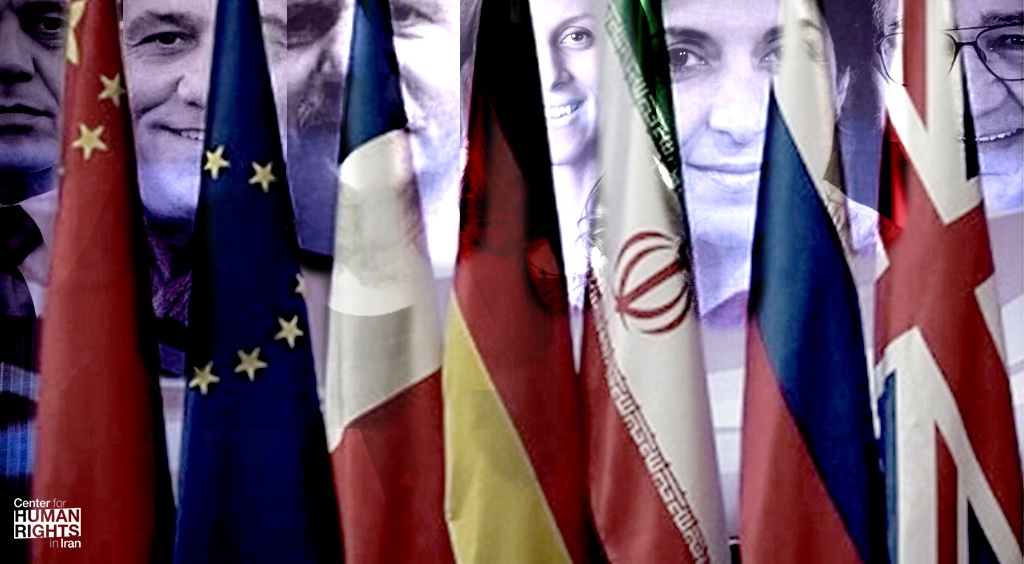 April 20, 2021—The situation of dual-nationals and foreign persons taken hostage and imprisoned by the Iranian government has not only remained unchanged, but in certain cases it has deteriorated, despite the new US administration’s approach to Iran and resumption of nuclear talks between the P5+1 and Iran in recent weeks.
April 20, 2021—The situation of dual-nationals and foreign persons taken hostage and imprisoned by the Iranian government has not only remained unchanged, but in certain cases it has deteriorated, despite the new US administration’s approach to Iran and resumption of nuclear talks between the P5+1 and Iran in recent weeks.
Tag Archive for Nazanin Zaghari-Ratcliffe
US, EU Should Seek Release of Dual-National Hostages in Tandem with Nuclear Talks
New Charges Thrown at Political Prisoners to Keep Them Behind Bars
State Responds to Growing Societal Discontent with Intensified Efforts to Silence All Dissent
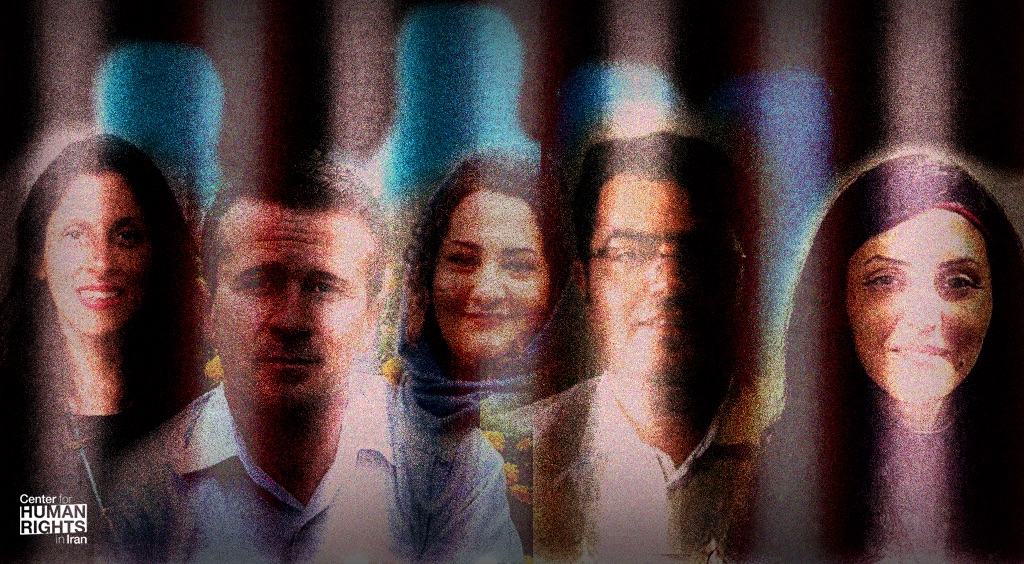
Rushed Convictions Show Judiciary Willing to Do Bidding of Intelligence Forces
October 1, 2020—In a blatant move to keep political prisoners in Iran behind bars despite completing their sentences, judicial authorities in Iran are increasingly issuing new charges and pushing through rushed convictions without any semblance of due process, just as a growing number of political prisoners are nearing release.
“Sham new convictions aimed at keeping political prisoners perpetually locked up shows the subservient role of the judiciary in Iran, which serves as the handmaiden for the security establishment,” said Hadi Ghaemi, executive director of the Center for Human Rights in Iran (CHRI).
CHRI calls on the judiciary to obey Iranian law by ensuring full due process rights in all prosecutions, which would not only mean an immediate review of the many new convictions for political prisoners that have been hurriedly pushed through for purely political purposes, but also a release of all political prisoners.
CHRI also urges the international community to forcefully condemn these new convictions and the continued imprisonment of individuals in Iran for their views and peaceful activities.
Suppression of Leading Voices of Dissent Intensifies as Protest Deepens in Iran
The imprisonment of activists, lawyers, journalists and other human rights defenders, under increasingly harsh sentences that include long prison terms and often lashes, has intensified in Iran as dissent and protest have grown over the last few years.
These individuals—defense attorneys, political and women’s activists, labor leaders and reporters—are widely respected amongst Iranian society and their voices carry weight. Their ability to articulate societal demands for basic civil and political rights and their willingness to call out the authorities on rights violations have made them a target for a state determined to stamp out dissent.
Dissent and peaceful protest has been an enduring feature of the Islamic Republic since its inception in 1979. Despite the risk of arrest and imprisonment, peaceful activism, student protests, campaigns for women’s rights, demonstrations against disputed election results and near continuous labor protests have gone on over the last four decades.
Yet over the last few years, dissent and protest have begun to shift in Iran, reflecting deeper societal discontent with the country’s economic and political systems. In December 2017, serious unrest broke out that encompassed hundreds of cities and towns across the country—including areas that had been pillars of support for the Islamic Republic—and sporadic protests took place through much of 2018, until widespread rage at economic mismanagement, corruption and political repression erupted into even larger nation-wide protests in November 2019.
The violence of the state’s response to the November 2019 protests—indiscriminate firing of live ammunition into crowds of civilians which resulted in hundreds of deaths and thousands arrested in the span of roughly a week—was unprecedented, suggesting a state that had come to decide it would crush all protest at any cost.
The authorities’ determination to keep prominent activists and human rights defenders behind bars should be seen in this context, as part and parcel of a broader state drive to silence dissent in Iran that involves multiple actions:
- Lethal state suppression of streets protests;
- Increasingly harsh prison sentences against lawyers who defend protestors, political prisoners or basic civil and political rights (for example, Nasrin Sotoudeh the prominent human rights lawyer, was given 38 years for defending the right to peacefully protest forced hijab);
- New manufactured charges and convictions rushed through to keep human rights defenders perpetually behind bars;
- Intensified repression of civil society organizations, such as the recent shuttering of the Imam Ali Popular Students’ Relief Society (IAPSRS), one of Iran’s most prominent civil society organizations that had worked on social issues such as poverty and children’s rights, and the arrest of its founder;
- Politically motivated executions and the use of the death penalty against protestors (such as the recent hanging of the wrestler Navid Afkari, who participated in the 2018 protests).
“The authorities in Iran have responded to the growing discontent in Iran with a clear message: we will silence dissenters, by whatever means necessary,” said Ghaemi.
Following are some of the prominent political prisoners who have been issued new charges and/or rushed convictions, in all cases without due process. There may well be more cases that are unknown, due to the lack of transparency in the Iranian judicial system.
Nazanin Zaghari-Ratcliffe
One of the latest cases concerns British-Iranian dual-national Nazanin Zaghari-Ratcliffe, who was arrested and imprisoned in April 2016 on baseless charges (and separated from her then 22-month-old daughter) when she traveled to Iran to visit her parents.
Zaghari-Ratcliffe, who has been on furlough from Evin Prison since March 17, 2020 as part of a mass release of prisoners to stem the spread of COVID-19 in Iran’s overcrowded prisons (but restricted to her parents’ home in Tehran, and separated from her young daughter and husband who are in the UK), is nearing the end of her five-year prison sentence for manufactured “espionage” charges.
Yet on September 8, 2020, Iran’s state broadcaster announced she was “facing new [as of yet unknown] charges,” just two days before the Iranian defense ministry issued a statement regarding a still unpaid 40-year-old debt owed to Iran by the UK for military equipment, which said: “London is expected to take practical and immediate steps to compensate for the past ….” A judge in Tehran previously admitted that Zaghari-Ratcliffe would not be released until Iran received payment for the debt owed by Britain.
Atena Daemi
Civil rights activist Atena Daemi was arrested in October 2014 by Iran’s Islamic Revolutionary Guard Corps’ (IRGC) Intelligence Organization for Facebook posts critical of the government, and for advocating for children’s rights and against capital punishment. In October 2015, she was sentenced to seven years in prison, five years of which was to be enforced based on Article 134 of Iran’s Islamic Penal Code, which allows for only the heaviest sentence to be imposed in the case of multiple sentences.
Daemi should have been freed on July 4, 2020, but as she neared her release date, a lower court sentenced Daemi in July 2019 (along with fellow civil rights activist Golrokh Sadeghi Iraee, see below) to an additional 3.7 years in prison on the charges of “insulting the supreme leader” (2.1 years) and “propaganda against the state” (1.6 years) because she condemned the executions of political prisoners and sang a revolutionary anthem in honor of executed prisoners. The sentence was upheld on appeal in September 2019, for which the activist would have to serve two years and one month in prison, based on Article 134.
Still more charges and convictions have been issued against the activist, in what seems to be a determined effort to keep Daemi behind bars. Daemi was sentenced to two more years in prison and 74 lashes, confirmed to Daemi’s lawyer on June 30, 2020, in a separate case which is currently being appealed.
Jafar Azimzadeh
Prominent labor activist and chairman of the Free Workers Union of Iran (FWUI), Jafar Azimzadeh, was last arrested on January 29, 2018, to continue serving a 2015 sentence for six years in prison—five years for “assembly and collusion against national security” and one year for “propaganda against the state.” The charges were based on his collection of 30,000 signatures from workers in support of a list of demands including the formation of independent unions, as well as for organizing labor protests and speaking to foreign media.
Based on Article 134, he had to serve no more than five years, and by February 2020, he had completed more than a third of his sentence, thereby qualifying for a pardon ordered at that time by the judiciary (due to the coronavirus threat in Iran’s prisons).
Yet months passed without his release, during which time the judiciary built a new case against him. In 2019, Azimzadeh and several other prisoners signed a statement to protest charging political prisoners for the cost of their medical expenses. That became the basis for the new case against him, as well as an audio message he recorded to protest heavy sentences issued against participants in a peaceful Labor Day rally.
He was quickly charged and convicted, and Branch 26 of the Revolutionary Court sentenced him to one year and one month in prison, which was upheld on Appeal. Azimzadeh was told he was pardoned for his previous case but now he has to serve his new sentence.
The labor leader is now serving his new term at Evin Prison—and he has since contracted COVID-19 in the overcrowded and unhygienic prison.
Esmail Abdi
The prominent teachers’ rights activist Esmail Abdi has been serving a six-year prison sentence, issued in November 2016, for his peaceful advocacy of teachers’ rights—five years for “assembly and collusion with the intention to disturb public order” and one year for “propaganda against the state.” Based on Article 134, he should serve no more than five years. As he was in detention prior to his conviction, he was due to be freed in November 2020.
Yet the high school teacher and former secretary-general of the Iranian Teachers’ Trade Association (ITTA) is now facing additional years in prison with the enforcement of a suspended sentence that was issued a decade ago.
Abdi was issued a suspended 10-year prison sentence in the fall of 2010 for “gathering information with the intention to disrupt national security” and “propaganda against the state.” In May 2020, Abdi’s lawyer, Hossein Taj told ILNA that the suspended sentence from 2010 had been put into force—despite the fact that the suspension was for five years and became null and void after that period.
Abdi had been furloughed due to the COVID-19 pandemic on March 17, 2020, but when he sought to extend his release on April 20, he was returned to Evin Prison. Abdi has contracted COVID-19 since being returned to Evin.
Golrokh Iraee Ebrahimi
On April 8, 2019, political prisoner Golrokh Iraee Ebrahimi was released from prison after completing a sentence she was serving since October 2016 for writing a fictional story that she had never published, and for her Facebook posts.
As she left Tehran’s Evin Prison, she was forced to post bail of 60 million tomans (14,242 USD) for a new case brought against her (along with fellow activist Atena Daemi) by the director of Evin Prison, Ali Chaharmahali, for writing open letters criticizing prison conditions, condemning the executions of political prisoners and singing the revolutionary anthem “Oh Martyr” in honor of the executed prisoners.
In July 2019, Judge Iman Afshari of Branch 26 of the Revolutionary Court in Tehran sentenced Iraee (and Daemi) to 3.7 years in prison for “insulting the supreme leader” (2.1 years) and “propaganda against the state” (1.6 years). Based on Article 134 of Iran’s Islamic Penal Code, they each must serve 2.1 years of the total sentence. The sentence was subsequently upheld on appeal—without a hearing.
On November 9, 2019, Iraee was taken into custody to begin her new sentence and two days later was taken to the notoriously inhumane Gharchak Prison in Varamin, south of Tehran.
Prisoners Unjustly Imprisoned Face New Threats Behind Bars from COVID-19
In addition to the continued imprisonment of these individuals for their dissenting views and peaceful activities, these new prosecutions aimed at keeping human rights defenders behind bars mean that political prisoners face an additional new risk: a heightened risk for contracting COVID-19 in Iran’s notoriously crowded and unhygienic prisons.
Iran’s political prisoners were largely left out of the country’s March 2020 mass release of prisoners, which was aimed at stemming the mounting deaths from COVID-19 in the country, which emerged as an early epicenter of the global pandemic.
Numerous political prisoners have tested positive for COVID-19 at Evin Prison and many more have displayed symptoms. Despite several prisoners having serious underlying health conditions, almost none have received proper medical care, and only a fraction of those displaying symptoms have been tested. As there is no separation of prisoners displaying symptoms, there are grave concerns that a large number of prisoners have contracted the virus.
Two of the prisoners mentioned above, Jafar Azimzadeh and Esmail Abdi, who were convicted of new sham charges as they were nearing their release dates, have now contracted COVID-19. More may have already contracted the virus as there is little testing in Iran’s prisons.
Iran to pardon 10,000 including ‘security’ prisoners
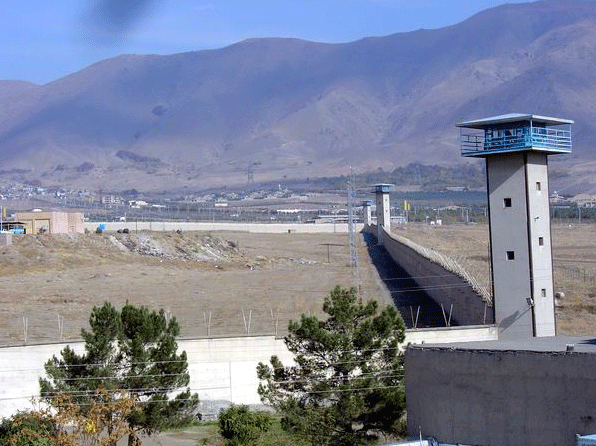 Announcement follows temporary release of 85,000 to ease pressure on prisons amid coronavirus crisis
Announcement follows temporary release of 85,000 to ease pressure on prisons amid coronavirus crisis
03.18.2020- Guardian – Iran is to pardon 10,000 prisoners including political ones in honour of the Iranian new year on Friday, according to state TV.
It was not stated whether the pardons would include the British-Iranian aid worker Nazanin Zaghari-Ratcliffe – who was released on Tuesday for two weeks, when 85,000 were let out temporarily because of coronavirus – or the British-Australian academic Kylie Moore-Gilbert, who was not known to have been released.
Nazanin Zaghari-Ratcliffe released from Iran prison
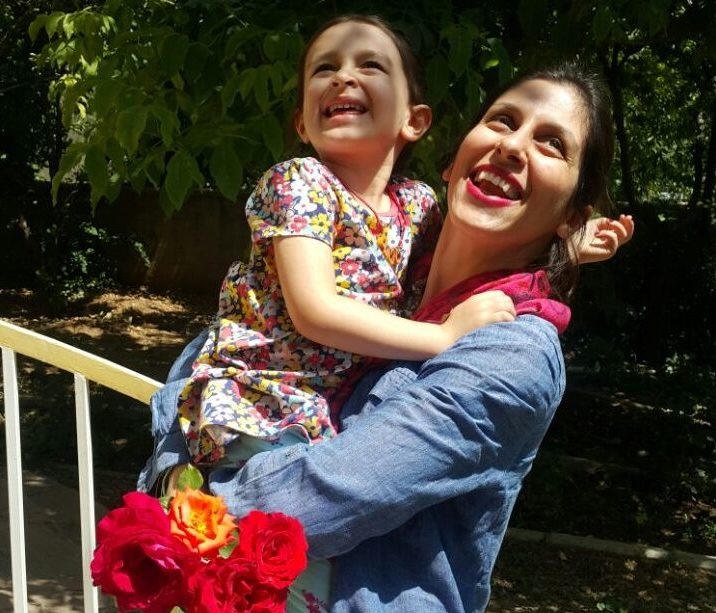 Nazanin Zaghari-Ratcliffe has been temporarily released from prison in Iran because of the coronavirus outbreak, her husband says.
Nazanin Zaghari-Ratcliffe has been temporarily released from prison in Iran because of the coronavirus outbreak, her husband says.
17 March 2020 – BBC – The British-Iranian charity worker will be required to wear an ankle tag and remain within 300m (984ft) of her parents’ home in Tehran.
“The issue now is to make it permanent,” her husband Richard Ratcliffe said.
He added: “It is hard to relax just yet.”
Richard Ratcliffe Takes Hunger Strike for Wife’s Freedom to Iran’s Doorstep in London

Dual National Nazanin Zaghari-Ratcliffe Has Been Eligible for Release Since 2017
June 18, 2019 – On day four of Richard Ratcliffe’s hunger strike outside the Iranian embassy in London, embassy staff noisily repositioned the metal barriers they’d put up behind him and started sanding the building to suppress coverage of his campaign for his imprisoned wife’s freedom.
Three Years Behind Bars
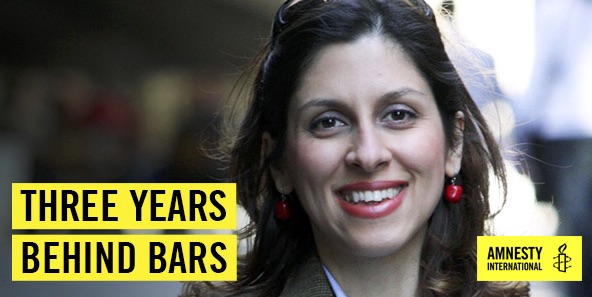 2019-04-03 – AMNESTY INTERNATIONAL- Nazanin Zaghari-Ratcliffe was arrested on this day three years ago, Iran.
2019-04-03 – AMNESTY INTERNATIONAL- Nazanin Zaghari-Ratcliffe was arrested on this day three years ago, Iran.
Since then we’ve been working closely with her husband Richard to campaign for her immediate release.
Mother of U.S. Navy veteran held in Iran worried about her son’s health
January 29, 2019 – CBS . Phoenix —The mother of a veteran detained in Iran is calling for his immediate release. Michael White, 46, has been in an Iranian prison for more than six months.
Jailed mother begins hunger strike as husband says she was ‘pushed to spy for Iran’

http://iransos.com/en/photo/2011/n/Nazanin-Zaghari-Ratcliffe-3.jpg
January 14, 2019- CNN – By Sheena McKenzie, London (CNN)A British-Iranian woman who has been jailed in Iran since 2016 began a hunger strike Monday in a desperate attempt to receive medical treatment, as her husband said that prison guards had asked her to spy on the UK in return for her freedom.
Iran should realise jailing Nazanin Zaghari‑Ratcliffe harms its security

Nazanin Zaghari-Ratcliffe is not alone, figuratively at least. Her incarceration is part of Iran’s wider war on women’s rights.’ Photograph: Peter Nicholls/Reuters
It is Tehran’s hardline clerics who are endangering the nation, not innocents languishing in the nation’s jails
Jan.11.2019 . Guardian – Simon Tisdall –
Iran’s merciless persecution of Nazanin Zaghari‑Ratcliffe, the Iranian-British woman held in Tehran’s Evin prison on spurious charges of spying, is deeply disturbing. What possible purpose was served by the airing this week on state television of a video showing her arrest in April 2016, as she prepared to board a plane to London?
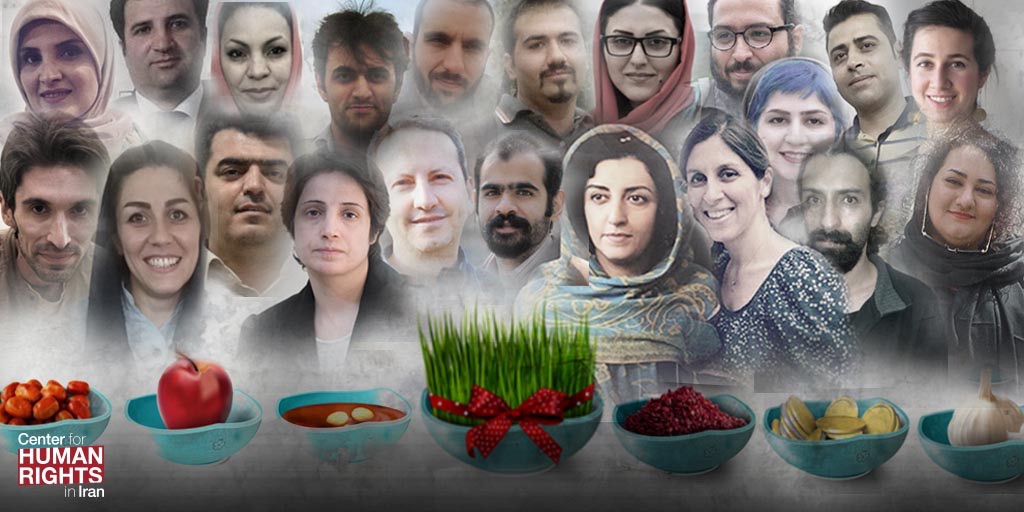 2019-03-20 – Spring is in the air and for millions of people around the world including Iran, it marks the beginning of a new year. The ancient festival of Nowruz (“new day”) is celebrated at the end of winter with festivities symbolizing rebirth, renewal and the possibility of new beginnings.
2019-03-20 – Spring is in the air and for millions of people around the world including Iran, it marks the beginning of a new year. The ancient festival of Nowruz (“new day”) is celebrated at the end of winter with festivities symbolizing rebirth, renewal and the possibility of new beginnings.